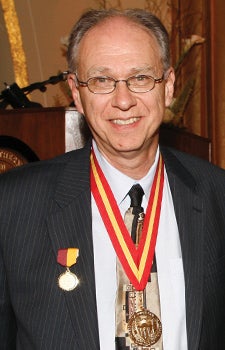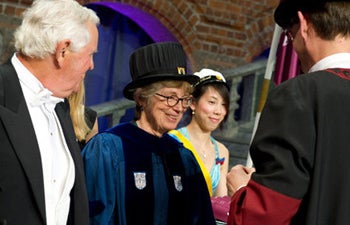USC Dornsife Professors Receive Honorary Degrees
Waterman Presented Honorary Doctorate
by Ambrosia Viramontes-Brody
Michael Waterman, widely regarded as the founding father of computational biology, openly admits he has never taken a biology course.
There was however a painful experience in an undergraduate botany class due to an antiquated textbook. Instead he stuck to studying mathematics and statistics with a passion for problem solving. The possibility of discovery in the new field of molecular biology attracted him to the discipline in the ’70s.
When mathematician Stan Ulam of the Los Alamos National Laboratory began to look at molecular biology with a focus toward then unformulated mathematics, Waterman decided to join in.
“I like finding things that I didn’t understand before,” said University Professor Waterman, USC Associates Chair in Natural Sciences and professor of biological sciences, computer science and mathematics in USC Dornsife. “Problem solving is a large part of science and math; if your goals came on a list it wouldn’t be nearly as interesting.”
Waterman’s work resulted in the development of several groundbreaking algorithms that serve as important elements in genome sequencing.
Tel Aviv University has recognized his pioneering work in the field with an honorary doctorate. The institute celebrated Waterman and eight other leaders in their respective disciplines during a grand honorary degree conferment ceremony May 14 at Tel Aviv University.
“It was very nice, completely unexpected,” said Waterman, who is currently studying simple word-count statistics to characterize or relate sequences. “It is quite humbling.”

University Professor Michael Waterman, who was honored by Tel Aviv University for his influential work in genomic science, received USC’s Presidential Medallion in 2008.
The university lauded the Oregon native for his revolutionary development of mathematical and statistical methods for deciphering the genome and his contributions to making bioinformatics an integral bridging discipline in the computational and life sciences. Waterman was acknowledged for his commitment to preparing young researchers in the field for decades, as well as for his extensive ties with Israel’s bioinformatics community and with scientists at Tel Aviv University in particular.
“Not only does this well-deserved honor highlight Mike’s enduring inspiration to his colleagues at USC and around the world,” said Howard Gillman, dean of USC Dornsife, “it also recognizes his tremendous efforts for nearly 30 years to train generations of students at USC Dornsife, many of whom have gone on to make their own indelible marks on the field. Mike is a beloved colleague and an exemplary member of our community, and we are so proud to see his work recognized in this way.”
The university also cited Waterman’s canonical publications and textbooks, which include his Introduction to Computational Biology: Maps, Sequences and Genomes, the first textbook on computational biology (CRC Press, 1995). In 2005, Waterman co-authored Computational Genome Analysis: An Introduction (Springer) with Simon Tavaré, George and Louise Kawamoto Chair in Biological Sciences, and Professor Emeritus of Biological Sciences Richard Deonier. In addition, Waterman is a founding editor of the Journal of Computational Biology and serves on the editorial board of seven journals.
“Mike developed groundbreaking mathematical and statistical methods for deciphering the genome; beyond the specific works – many of which have been ‘textbook classics’ in the community for decades – he wrote some of the pioneering textbooks and founded the first computational biology journal, which helped make bioinformatics an established research field,” said Ron Shamir, Raymond and Beverly Sackler Professor of Bioinformatics and head of the Edmond J. Safra Bioinformatics Program at Tel Aviv University’s Blavatnik School of Computer Science. “He also made unparalleled contributions to making bioinformatics an integral and bridging discipline in the computational and life sciences.”
“He has devoted his time and attention unsparingly to the community, and mentored many students and young researchers who went on to develop highly regarded independent careers in the field,” he added. “By any measure, he is one of the heroes of this field – and of mine.”
Past Tel Aviv University honorary doctorate recipients include Bill Clinton, Margaret Thatcher, Ronald Reagan, Henry Kissinger and Elie Wiesel.
In 1981, Waterman and biomedical engineering professor Temple Smith, then researchers at the Los Alamos National Laboratory, co-developed the Smith-Waterman algorithm that works similar to that of a rigorous Google search of huge databases of biological sequences. The mathematical foundation allows scientists to compare protein and gene sequences.
Earning his bachelor’s in mathematics at Oregon State University and a Ph.D. in statistics and probability from Michigan State University, Waterman in 1982 joined USC Dornsife, where he continued his journey of discovery. In 1988, he and Eric Lander, professor of biology at the Massachusetts Institute of Technology, developed the Lander-Waterman formula. The algorithm used for physical mapping provides scientists with a tool to use when attempting to read DNA sequences to determine whether the project is proceeding correctly. In 1995 he and Ramana Idury put forward the use of Eulerian graphs for assembling DNA sequences from experimental data; that method is widely used today.
From 2003 to 2008, Waterman directed the Center of Excellence in Genomic Science (CEGS) at USC supported by a $18.7 million grant from the National Institutes of Health (NIH). As the CEGS principal investigator, Waterman led USC researchers in understanding the human genome’s haplotypes, the common strings of DNA that are passed through generations. The CEGS at USC received a $12.1 million grant renewal from the NIH in 2009 and now under the direction of Tavaré is building upon these advances.
Waterman has also held visiting positions at several universities including the University of Hawaii, Mt. Sinai Medical School and has held the Aisenstadt Chair at University of Montreal, and was the 150th Anniversary Visiting Professor at Chalmers University in Sweden.
Waterman’s unparalleled contributions have earned him numerous distinctions. Named a Guggenheim Fellow in 1995, he was elected to the American Academy of Arts and Sciences that same year and to the National Academy of Sciences in 2001. He is also a fellow of the American Association for the Advancement of Science, Institute of Mathematical Statistics, Society of Industrial and Applied Mathematics and International Society of Computational Biology. Waterman received the Presidential Medallion, USC’s top honor, in 2008 and USC Dornsife’s Award for Excellence in 2004 and Albert S. Raubenheimer Outstanding Faculty Award in 2009.
View the conferment ceremony on YouTube.
Swedish Institute Confers Honorary Doctorate on Margaret Gatz
by Eddie North-Hager
Margaret Gatz knew she was onto something special when she arrived in Sweden 25 years ago. She was invited to join a group of researchers who had discovered a sample of twins raised apart that largely had been forgotten.
Together they designed a study to compare both identical and fraternal twins reared apart to a sample of twins who had been reared together. Because the subjects reared apart were now old, it was an ideal situation for studying nature versus nurture in human aging. Soon the study of dementia expanded to the entire Swedish twin registry, which involved recontacting twins who had not been contacted for 25 years.
No one had ever had access to a sample this large before — nearly 12,000 twins, aged 65 and older, including identical twins, who share all of their genes, and fraternal twins, who are as genetically alike as any siblings.
The findings — including that up to 80 percent of the risk for Alzheimer’s disease may be due to genetic factors, while other contributors may come from infections, diabetes and obesity earlier in life — have led to awards, accolades, millions of dollars in grants and 130 papers.
But the normally reserved chair of the USC Dornife psychology department, and professor of psychology, gerontology and preventive medicine, clearly was affected by the news that the Karolinska Institutet chose to confer an honorary doctorate upon her.
“It’s an enormous honor to be recognized with an honorary degree. I had not anticipated that it would happen in my entire life,” Gatz said. “I am awed by the honor.”

USC Dornsife professor and psychology department chair Margaret Gatz receives her honor in Stockholm City Hall.
The ceremony took place on May 13 in Stockholm City Hall, where the Nobel Prizes are awarded. Since 1901, the Nobel Assembly at Karolinska Institutet has selected the Nobel laureates in physiology or medicine.
The Institutet, founded by King Karl XIII in 1810 as an “academy for the training of skilled army surgeons,” accounts for more than 40 percent of the medical research conducted in Sweden.
Microsoft chairman Bill Gates, who earned his honorary doctorate in 2008, is among the previous honorees.
“Margaret Gatz has influenced a whole generation of researchers in the fields of epidemiology of neurodegenerative disease, psychiatry and clinical psychology,” said Martin Ingvar, dean of research at the Karolinska Institutet. “She has substantially contributed to the massive scientific achievements based on the Swedish twin registry. Karolinska Institutet cannot find a researcher more worthy of an honorary doctorate.”
The white-tie affair ended with the bestowal of a diploma, ring and a Puritan-like hat.
Trips from Los Angeles to Sweden are not uncommon for Gatz, but with technological advances, they have become fewer. By necessity and to move her studies ahead at full speed, Gatz has become fluent in applying social media tools to her global research.
“When we began, we used bitnet to communicate,” Gatz recalled. “I got the first fax machine in the psychology department. Today the ability to share data files and conference on Skype has changed the way we can collaborate. It has made a huge impact on our ability to work together. When the twin registry begun, it was not even computerized.
“The history of world communications has very much affected our ability to do research,” she said.
Gatz, who came to USC in 1978, is the chair of the Department of Psychology and a foreign adjunct professor at Karolinska Institutet.
“Her studies have provided totally new insights into the role of genetic and environmental risk factors for Alzheimer’s disease (AD) and other dementias,” reads the Karolinska Institutet’s profile of Gatz. “Not only has she been able to definitively establish the substantial heritability of AD, her study has provided remarkable insights into the role of genetic and environmental risk factors. Gatz and colleagues demonstrated that genetic influences on depression were different in men and women; the role of cardiovascular disorders in depresssion; [and] depression as a prodrome of dementia — all based on Swedish materials.”